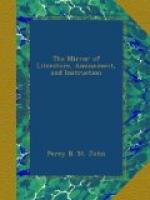He dies, aged fifty-seven, of a pleuritic attack, complicated with angina pectoris; and having left fifty pounds to each of the principal charitable institutions of his neighbourhood, and fifty pounds to the churchwardens of his parish, to be distributed amongst the poor professing the religion of the Church of England, he is buried in his “family vault,” and his last wish fulfilled,—that is to say, his epitaph is composed in Latin, and the inscription put up under the especial care and inspection of his friend Dr. Dusty of Oxford. Requiescat.
* * * * *
THE VILLAGE CEMETERY.
In the New Monthly Magazine, just published is a powerful poem—the Splendid Village, by the author of “Corn-law Rhymes.” from which we extract the following passage:
I sought the churchyard where the lifeless
lie,
And envied them, they rest so peacefully.
“No wretch comes here, at dead of
night.” I said,
“To drag the weary from his hard-earn’d
bed;
No schoolboys here with mournful relics
play,
And kick the ‘dome of thought’
o’er common clay;
No city cur snarls here o’er dead
men’s bones;
No sordid fiend removes memorial stones.
The dead have here what to the dead belongs,
Though legislation makes not laws, but
wrongs.”
I sought a letter’d stone, on which
my tears
Had fall’n like thunder-rain, in
other years,
My mother’s grave I sought, in my
despair,
But found it not! our grave-stone was
not there!
No we were fallen men, mere workhouse
slaves,
And how could fallen men have names or
graves?
I thought of sorrow in the wilderness,
And death in solitude, and pitiless
Interment in the tiger’s hideous
maw:
I pray’d, and, praying, turn’d
from all I saw;
My prayers were curses! But the sexton
came;
How my heart yearn’d to name my
Hannah’s name!
White was his hair, for full of days was
he,
And walk’d o’er tombstones,
like their history.
With well feign’d carelessness I
rais’d a spade,
Left near a grave, which seem’d
but newly made,
And ask’d who slept below?
“You knew him well,”
The old man answer’d, “Sir,
his name was Bell.
He had a sister—she, alas!
is gone,
Body and soul. Sir! for she married
one
Unworthy of her. Many a corpse he
took
From this churchyard.” And
then his head he shook,
And utter’d—whispering
low, as if in fear
That the old stones and senseless dead
would hear—
A word, a verb, a noun, too widely famed,
Which makes me blush to hear my country
named.
That word he utter’d, gazing on
my face,
As if he loath’d my thoughts, then
paus’d a space.
“Sir,” he resumed, “a
sad death Hannah died;
Her husband—kill’d her,
or his own son lied.
Vain is your voyage o’er the briny
wave,




